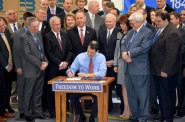7 Ways to Fight the Brain Drain
UW System cuts don't help, but taking the right steps can improve system and retain graduates.
The state’s brain drain and the fiscal crunch at UW System are inter-connected.
But the financial clamp on the University of Wisconsin System could be an opportunity for positive change –- if the state’s political and educational leaders keep the big picture in mind. So far, they haven’t.
Here’s the reality on the two biggest economic issues facing Wisconsin: 1. Bloated state costs for health care are crowding out other strategic priorities like higher education and 2. A brain drain of more than 14,000 college graduates a year is sapping our talent pool.
Timid on these issues to date, our leaders need to innovate to tackle the UW’s cost/revenue equations and the loss of one graduate from the state for every three the UW System graduates: Here are some managerial levers to move the needle on both issues, plus a few others:
1. Turn the 26 UW campuses loose to buy their own health care. They spend more than a half billion dollars annually on poorly designed health plans run out Madison. If they followed private sector plans that improve health and lower costs, they could save $100 million per year, or more.
2. That step alone would offset most of the Republican cuts to the system. That in turn would dampen the appetite of UW – Madison for out-of-state students who payer higher tuitions. Those are the students who mostly don’t stay after graduation. In-state students are far more likely to remain Badgers and reduce the brain drain. In short, we need far more Wisconsin kids at Madison and far fewer from out of state. Chancellor Rebecca Blank is going the other way. It should be long-term economic building versus short-term gains in tuition dollars.
3. Some 3000 Minnesota students attend Madison; we subsidize them; and most return to Minnesota or go to other states for their careers. Make the hard call to end the reciprocity program at the Madison campus, where the demand from Wisconsin kids is close to infinite. But keep it in place for our other campuses, like River Falls and Superior, where there is a shortage of students. UW System already excludes Madison from a similar Midwest compact program, but not from the Minnesota giveaway.
4. Work with the gargantuan foundations that support UW – Madison to send a much bigger portion of their earnings to that campus. If the Wisconsin Alumni Research Foundation (WARF), for example, sent back half its royalty revenues and 5% of its assets on its $3 billion portfolio, it could have contribute around $200 million to the campus. It contributed less than half of that. Instead of hoarding its monies, WARF alone could cover the Republican cut to the flagship campus. One analyst has proposed that such foundations give back 8% per year. They earn more than that on average.
6. As suggested before, reorganize the university along regional lines, which would allow a major reduction in the over-sized system staff in Madison. That central office spends tons of dough per year, and it is hard to see its value-add. The regional set-up would also allow some administrative consolidation, such as once one chancellor for the five UW campuses in the M7 Region compared to three chancellors and a dean now. With lower costs, the system would have less need to troll for out-of-state tuitions. Further, better economic growth from more engaged and effective regional universities would stimulate stronger job growth and fewer grads leaving for richer shores.
7. Retention of college-educated people in the state would undoubtedly tackle another Wisconsin challenge: the need to create more startup companies. They are the kinds of people who launch high-growth ventures.
In summary, there is a readily available package of bold reforms that could materially ease the pain of losing UW resources and losing too many of our human resources to other states.
It should be a matter of state pride to resolve both issues.
John Torinus is the chairman of Serigraph Inc. and a former Milwaukee Sentinel business editor who blogs regularly at johntorinus.com.
Torinus
-
How Hillary Could Win GOP Votes
 May 9th, 2016 by John Torinus
May 9th, 2016 by John Torinus
-
Walker Targets Health Care Savings
 Feb 2nd, 2016 by John Torinus
Feb 2nd, 2016 by John Torinus
-
Cheap Surgery on a Tourist Isle
 Jan 12th, 2016 by John Torinus
Jan 12th, 2016 by John Torinus






















John: Please provide support for some of your assertions in this piece.
A) “Turn the 26 UW campuses loose to buy their own health care. They spend more than a half billion dollars annually on poorly designed health plans run out Madison. If they followed private sector plans that improve health and lower costs, they could save $100 million per year, or more.” Prove that health benefits would be comprehensively better for less money.
B) “In short, we need far more Wisconsin kids at Madison and far fewer from out of state.” One point of higher education is to create opportunities for diverse peoples to interact and benefit from differing viewpoints. This sounds like a way to maintain an insularity of viewpoints.
C) “WARF alone could cover the Republican cut to the flagship campus.” Trot out some figures that show WARF does not pull its weight. What other initiatives does it fund, and what are the value of those? Convince us.
In addition to these issues, how have the policies of Gov. Walker and his associates affected the economy in Wisconsin. We are performing worse over time than other states, and our Wisconsin Economic Development Corporation is a laughing stock of cronyism. Not every aspect of this failure can be laid at Walker’s feet, but many can. Surely, these aspects are at least as significant as the focus you bring to this short article.
No doubt there are ways that the University of Wisconsin and its component colleges and campuses can find efficiencies, but it gives one pause that your commentary remains vague and largely without discussion of destructive actions taken by the current administration. It is one thing to acknowledge that the cuts came from the GOP contingent of the Legislature, it is another thing entirely to suggest the remedy should come only from the target of these cuts. These cuts were overwhelmingly political, not spurred by sound economic principles. As such, analysis must include the political thrust of the situation we find ourselves in. Anything less is poor journalism, particularly from someone with a newspaper background.
Did you get your “talking points from the Wisconsin republican party? You parrot Act 10 as if that’s the only option that is available. Just take all cuts to anything out of employee compensation? That’s ridiculous. If you expect high qualitty people to stay you have to keep and create high paying jobs with good benefits. Otherwise they will leave the state. Your ioption is nothing more than a conservative wet dream.
You also offer very little in the way of concrete resolutions to the problem. If there are no jobs for students with advanced degrees they won’t stay. Wisconsin businesses conttinue to add more low end jobs than higher paying jobs. That isn’t going to change because of the student make up at UW. This is far more about pushing a conservative agenda then it is about offering real solutions.